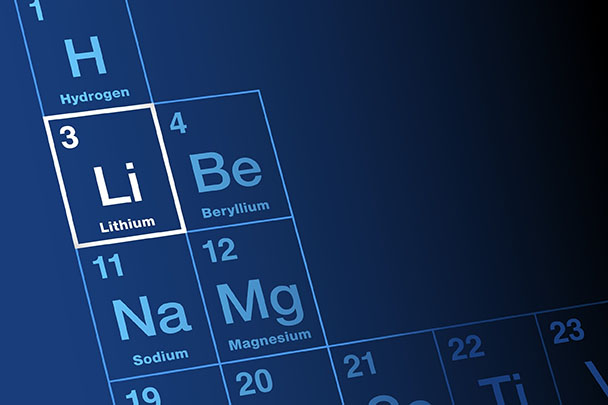

Lithium is the lightest metal and the third most abundant element in the Earth's crust. It is a soft, silvery-white metal that is highly reactive. Lithium reacts with water to form lithium hydroxide, which is a strong base. Lithium also reacts with other elements, such as oxygen and nitrogen, to form compounds.
Lithium is used in a variety of applications, including:
Lithium is a valuable metal with a wide range of applications. It is important to handle lithium with care, as it is a very reactive metal.
Lithium is the lightest metal in the periodic table.

Noun: Lithium is the lightest metal in the periodic table. It is a soft, silvery-white metal that reacts violently with water.
Adjective: Lithium can also be used as an adjective to describe something that contains lithium or is made of lithium. For example, a lithium battery is a battery that uses lithium as its anode.
Verb: To lithiumate is to add lithium to something. For example, to lithiumate a compound is to add lithium ions to it.
The word "lithium" comes from the Greek word "lithos", which means "stone". It was first used in English in the 18th century.
The Greek word "lithos" is related to the Latin word "lapis", which also means "stone".
What can lithium be used for?
Question:
Discuss the properties and uses of lithium as an element. Highlight its significance in both everyday life and technological applications.
Answer:
Lithium is a chemical element with a range of unique properties that make it highly valuable in various aspects of our lives. It's the lightest metal and the lightest solid element, which contributes to its distinct characteristics.
One of the most well-known uses of lithium is in rechargeable batteries. Lithium-ion batteries power a wide array of devices, from smartphones and laptops to electric vehicles. Its low atomic weight and ability to store and release energy efficiently make it an ideal choice for this application.
Lithium also has medical applications. Lithium carbonate is used to treat bipolar disorder and depression. Its effects on stabilising mood have been beneficial in managing these conditions.
Moreover, lithium plays a role in nuclear fusion research, where it serves as fuel for experimental fusion reactors due to its ability to release vast amounts of energy.
In everyday life, lithium-based lubricants and greases help reduce friction in machinery and equipment. Its heat resistance and conductivity also find use in ceramics and glass production.
Furthermore, lithium's presence in the Earth's crust is crucial for geological studies and understanding of Earth's history.
Address
Developing Experts Limited
Exchange Street Buildings
35-37 Exchange Street
Norwich
NR2 1DP
UK
Phone
01603 273515
Email
hello@developingexperts.com
Copyright 2025 Developing Experts, All rights reserved.